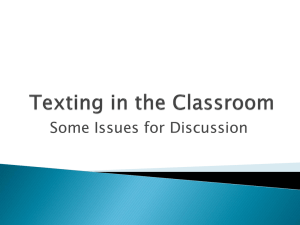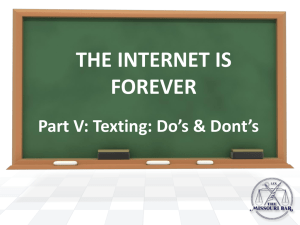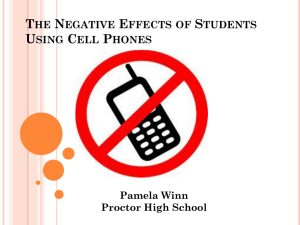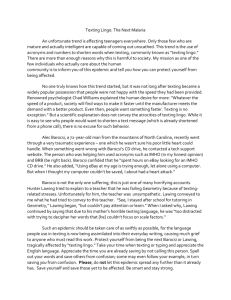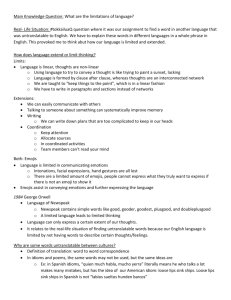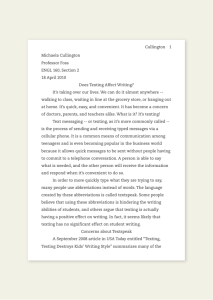The Death of English
advertisement
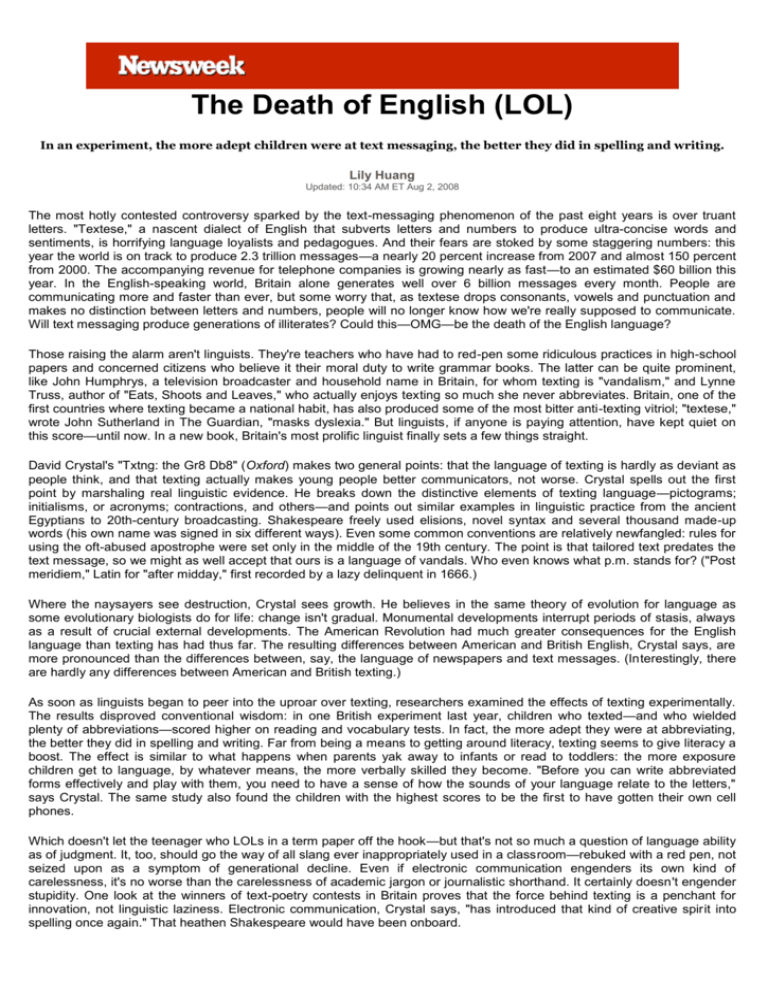
The Death of English (LOL) In an experiment, the more adept children were at text messaging, the better they did in spelling and writing. Lily Huang Updated: 10:34 AM ET Aug 2, 2008 The most hotly contested controversy sparked by the text-messaging phenomenon of the past eight years is over truant letters. "Textese," a nascent dialect of English that subverts letters and numbers to produce ultra-concise words and sentiments, is horrifying language loyalists and pedagogues. And their fears are stoked by some staggering numbers: this year the world is on track to produce 2.3 trillion messages—a nearly 20 percent increase from 2007 and almost 150 percent from 2000. The accompanying revenue for telephone companies is growing nearly as fast—to an estimated $60 billion this year. In the English-speaking world, Britain alone generates well over 6 billion messages every month. People are communicating more and faster than ever, but some worry that, as textese drops consonants, vowels and punctuation and makes no distinction between letters and numbers, people will no longer know how we're really supposed to communicate. Will text messaging produce generations of illiterates? Could this—OMG—be the death of the English language? Those raising the alarm aren't linguists. They're teachers who have had to red-pen some ridiculous practices in high-school papers and concerned citizens who believe it their moral duty to write grammar books. The latter can be quite prominent, like John Humphrys, a television broadcaster and household name in Britain, for whom texting is "vandalism," and Lynne Truss, author of "Eats, Shoots and Leaves," who actually enjoys texting so much she never abbreviates. Britain, one of the first countries where texting became a national habit, has also produced some of the most bitter anti-texting vitriol; "textese," wrote John Sutherland in The Guardian, "masks dyslexia." But linguists, if anyone is paying attention, have kept quiet on this score—until now. In a new book, Britain's most prolific linguist finally sets a few things straight. David Crystal's "Txtng: the Gr8 Db8" (Oxford) makes two general points: that the language of texting is hardly as deviant as people think, and that texting actually makes young people better communicators, not worse. Crystal spells out the first point by marshaling real linguistic evidence. He breaks down the distinctive elements of texting language—pictograms; initialisms, or acronyms; contractions, and others—and points out similar examples in linguistic practice from the ancient Egyptians to 20th-century broadcasting. Shakespeare freely used elisions, novel syntax and several thousand made-up words (his own name was signed in six different ways). Even some common conventions are relatively newfangled: rules for using the oft-abused apostrophe were set only in the middle of the 19th century. The point is that tailored text predates the text message, so we might as well accept that ours is a language of vandals. Who even knows what p.m. stands for? ("Post meridiem," Latin for "after midday," first recorded by a lazy delinquent in 1666.) Where the naysayers see destruction, Crystal sees growth. He believes in the same theory of evolution for language as some evolutionary biologists do for life: change isn't gradual. Monumental developments interrupt periods of stasis, always as a result of crucial external developments. The American Revolution had much greater consequences for the English language than texting has had thus far. The resulting differences between American and British English, Crystal says, are more pronounced than the differences between, say, the language of newspapers and text messages. (Interestingly, there are hardly any differences between American and British texting.) As soon as linguists began to peer into the uproar over texting, researchers examined the effects of texting experimentally. The results disproved conventional wisdom: in one British experiment last year, children who texted—and who wielded plenty of abbreviations—scored higher on reading and vocabulary tests. In fact, the more adept they were at abbreviating, the better they did in spelling and writing. Far from being a means to getting around literacy, texting seems to give literacy a boost. The effect is similar to what happens when parents yak away to infants or read to toddlers: the more exposure children get to language, by whatever means, the more verbally skilled they become. "Before you can write abbreviated forms effectively and play with them, you need to have a sense of how the sounds of your language relate to the letters," says Crystal. The same study also found the children with the highest scores to be the first to have gotten their own cell phones. Which doesn't let the teenager who LOLs in a term paper off the hook—but that's not so much a question of language ability as of judgment. It, too, should go the way of all slang ever inappropriately used in a classroom—rebuked with a red pen, not seized upon as a symptom of generational decline. Even if electronic communication engenders its own kind of carelessness, it's no worse than the carelessness of academic jargon or journalistic shorthand. It certainly doesn't engender stupidity. One look at the winners of text-poetry contests in Britain proves that the force behind texting is a penchant for innovation, not linguistic laziness. Electronic communication, Crystal says, "has introduced that kind of creative spirit into spelling once again." That heathen Shakespeare would have been onboard.
